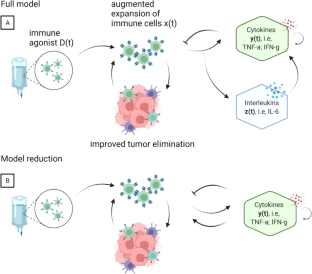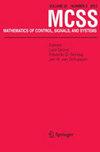Cytokine storm mitigation for exogenous immune agonists
IF 1.8
4区 计算机科学
Q3 AUTOMATION & CONTROL SYSTEMS
引用次数: 0
Abstract
Cytokine storm is a life-threatening inflammatory response characterized by hyperactivation of the immune system. It can be caused by various therapies, auto-immune conditions, or pathogens, such as respiratory syndrome coronavirus 2 which causes coronavirus disease COVID-19. Here we propose a conceptual mathematical model describing the phenomenology of cytokine-immune interactions when a tumor is treated by an exogenous immune cell agonist which has the potential to cause a cytokine storm, such as CAR T cell therapy. Numerical simulations reveal that as a function of just two model parameters, the same drug dose and regimen could result in one of four outcomes: treatment success without a storm, treatment success with a storm, treatment failure without a storm, and treatment failure with a storm. We then explore a scenario in which tumor control is accompanied by a storm and ask if it is possible to modulate the duration and frequency of drug administration (without changing the cumulative dose) in order to preserve efficacy while preventing the storm. Simulations reveal existence of a “sweet spot” in protocol space (number versus spacing of doses) for which tumor control is achieved without inducing a cytokine storm. This theoretical model, which contains a number of parameters that can be estimated experimentally, contributes to our understanding of what triggers a cytokine storm, and how the likelihood of its occurrence can be mitigated.

外源性免疫激动剂的细胞因子风暴缓解
细胞因子风暴是一种危及生命的炎症反应,其特征是免疫系统的过度激活。它可能是由各种疗法、自身免疫状况或病原体引起的,例如导致冠状病毒病COVID-19的呼吸综合征冠状病毒2。在这里,我们提出了一个概念性的数学模型,描述了当肿瘤被外源性免疫细胞激动剂治疗时,细胞因子-免疫相互作用的现象,这种激动剂有可能引起细胞因子风暴,如CAR - T细胞治疗。数值模拟表明,作为两个模型参数的函数,相同的药物剂量和方案可能导致以下四种结果之一:无风暴治疗成功、有风暴治疗成功、无风暴治疗失败和有风暴治疗失败。然后,我们探索了肿瘤控制伴随着风暴的情况,并询问是否有可能调节药物给药的持续时间和频率(不改变累积剂量),以便在预防风暴的同时保持疗效。模拟表明,在方案空间(剂量数量与剂量间隔)中存在一个“最佳点”,在此点上,肿瘤控制可以在不诱导细胞因子风暴的情况下实现。这个理论模型包含了许多可以通过实验估计的参数,有助于我们理解是什么触发了细胞因子风暴,以及如何降低其发生的可能性。
本文章由计算机程序翻译,如有差异,请以英文原文为准。
求助全文
约1分钟内获得全文
求助全文
来源期刊

Mathematics of Control Signals and Systems
工程技术-工程:电子与电气
CiteScore
2.90
自引率
0.00%
发文量
18
审稿时长
>12 weeks
期刊介绍:
Mathematics of Control, Signals, and Systems (MCSS) is an international journal devoted to mathematical control and system theory, including system theoretic aspects of signal processing.
Its unique feature is its focus on mathematical system theory; it concentrates on the mathematical theory of systems with inputs and/or outputs and dynamics that are typically described by deterministic or stochastic ordinary or partial differential equations, differential algebraic equations or difference equations.
Potential topics include, but are not limited to controllability, observability, and realization theory, stability theory of nonlinear systems, system identification, mathematical aspects of switched, hybrid, networked, and stochastic systems, and system theoretic aspects of optimal control and other controller design techniques. Application oriented papers are welcome if they contain a significant theoretical contribution.
 求助内容:
求助内容: 应助结果提醒方式:
应助结果提醒方式:


